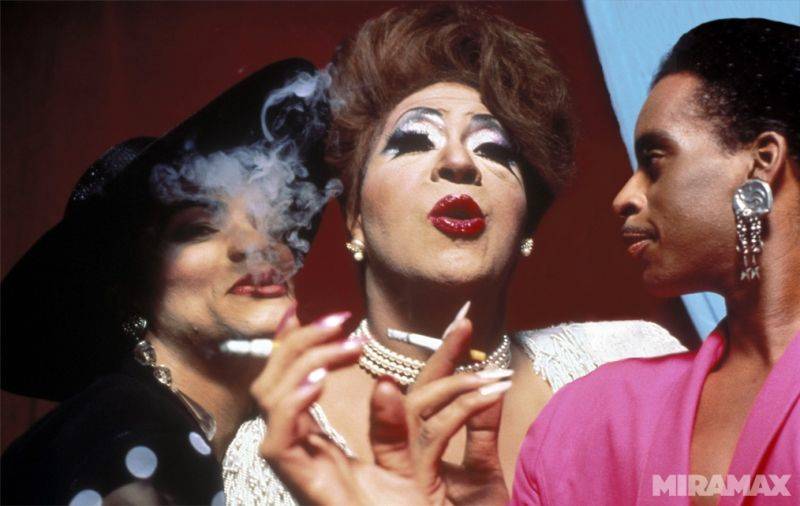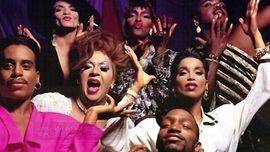Editor’s Note: In conjunction with the University of Illinois Dance Department, the Art Theater Co-op is spending the next few Tuesdays putting dance on the big screen. In a celebration that presents “a variety of films and shorts dedicated to dance performance, dance for camera, influential artists in the field, and social impact of dance across the world” (Art Co-op phrasing), the selected films will include several short films as well as headliners like Royal Wedding, Flex is Kings, and the 1980s documentary Paris is Burning.

As an introduction to the Festival, Smile Politely’s Thom Schnarre filed this essay about the film Paris is Burning:
“I don’t tell you you’re ugly because you already know… so, I don’t tell you. That’s shade.” — Dorian Corey, as quoted in the documentary Paris is Burning.
Jesus Christ, the queer climate of 2014 America is both dizzying and terrifying for an old queen like me. Yes children, Great-Grandmama Thom is gonna school your asses a bit, so just buckle up, take a deep slurp of the cocktail of your choosing, and sit tight. And put out those goddamn cigarettes! There are ladies present!
Now that I have your attention, let me elaborate: On the positive side of the equality equation is a rapidly growing number of people who are increasingly offended by the bullying and demonizing of LGBT youth and who are supportive of LGBT individuals in their collective struggles. Then there is the increased visibility of various LGBT causes through social media and the like. And the cherry on our sundae is nineteen states now recognizing same sex marriage, with the numbers steadily climbing with court after court denying states the right to discriminate against us based upon sexual orientation. And, while same sex marriage does not wipe out every social ill practiced against the LGBT community, the states’ recognition of our relationships as legitimate and legal is a huge achievement that can only enhance our ability to be respected and protected in other areas of our struggle.
Marriage is a normative act, and it’s hard to make someone feel like a freak when one of the touchstones of normality is offered to them as well. Amen and Hallelujah, this is further than I thought we’d ever get; and, while I am incredibly moved by these milestones, I am also scared as hell at the thought of a potential loss of them due to a conservative social backlash. All one has to do is consult this past week’s viral Facebook video of a gay teen’s parents verbally and physically assaulting him — because their church and their fucked-up misconception of God tells them it’s just dandy to do so — to see how far we have yet to go. While the support for this kid (after the fact) is overwhelming and touching, the sickening thud of every hate-filled word and unseen fisticuff delivered by both parents to their child shows that hate is just a download button away.
Each one of the previously mentioned gains could also be eroded by just the wrong judge listening to just the right case, or perhaps Scalia and his pet conserva-trolls trying to rein us in as they’ve done to women in recent months. Or there’s always the fear of the collective cash flows of the Churches-of-the-Imaginary-Friend lobbying us back into the closet or worse. We are on the brink of understanding and true equality, but with a shit-ton of ignorance chewing at the bit to throw us back into the 1950s, with the resounding thud of their precious prison’s retro-fitted doors. Progress, or the last gasps to the dying status quo, are both real possibilities in our current culture. God Bless America!
Why so glum, you might be asking? When looking at queer history, it’s easy to put on our current rose-colored glasses and see the struggles of the past as charming relics of times gone by and not as ongoing in today’s political landscape. This brings us to the reason for the above diatribe: the partnership of the University of Illinois’ School of Dance with the Art Theatre Co-op will, over the next few weeks, screen several dance-related films, one of which is the iconic documentary Paris is Burning. This documentary focuses on a two year period, from 1987-89, in the life of the New York Ball Circuit, the predominantly black drag extravaganza scene which resulted in the invention of Voguing, a style of dance characterized in the film as possessing, “a series of stylized poses and movements referencing the hieroglyphs of Ancient Egypt, contemporary gymnastics, and the awkwardly defined lines of the body.” These staccato and precise dance moves were later immortalized in Madonna’s music video for her mid-career hit “Vogue,” so, if this sounds familiar to you, that’s probably where you were first exposed.
Voguing is not only a dance style, but also a way of battling your competition in the various levels of battle in the Ball Circuit scene. Dorian Corey noted, in the quote beginning this article, that Voguing was the bodily expression of the drag community throwing shade at one another, a higher class form of insult acknowledging the struggle of its target, while putting that target in its place. Watching two dancers vogue, one can easily see the dancers’ struggle for dominance and their condescending attitude toward their competition. As shade is verbally informing all around that you are the alpha diva, Voguing is the dance equivalent of pissing a circle around your prize and shouting “MINE!” It’s a delight to watch, and the film gives you some stellar moments of the dance style in action.
Through the film’s cinema verite’ depiction, we are also introduced to the Ball Circuit’s tightly-knit and complex community. Its members tell the stories of individuals who have been taught they deserve no respect, but gain it through their own complex rituals of passage, including dance, movement, and exquisitely opulent fashion. These are poor kids of color longing for something more, and the something more in question usually has a high-end price tag. The Circuit competitions allow their members to both embrace the stereotypes of passing for straight and to then abandon them in a decadent fantasy of affluent camp and sleight-of-hand gender-bending so spot-on that the keenest straight observer will not notice these drag stars passing through their midst… unless said divas wish them to notice. Watching these kids pose as Ivy League preppies or bad-ass military grunts is a fascinating journey into empowerment through costuming and attitude.
“You are a triple threat: poor, black, and gay.” This is a quote from one of the young boys’ fathers. “And that is gonna take a lot of fuckin’ strength to survive.” Preach it, Mister! These queens and their created families have both pageantry and an envy for all that glitters in their Dynasty-inspired imaginations. Their hunger for the finer things in life (as seen in every 80s television hit) is only matched by their hunger for acceptance and self-respect. Each house of drag is a created family, sometimes motivated by the participants being disowned by their biological families. Said created families are inspired by a long history of style and irreverence that provides strength and self-worth to the family members, with names like Chanel and St. Laurent becoming their adopted names and a badge of honor and prestige. These boys are charming grifters doing what they can to survive, and their social clubs are the trophies for their efforts, even when those clubs are tinged with petty larceny and prostitution. And, while this world provides a safe-haven for these young men and women, the threat of the outside world is only a careless decision away—as proved by one of through focal interviewee’s untimely death.
Venus — a lovely young drag queen who dreams of stardom and glamour — is found strangled under a hotel bed after an ill-fated tryst. The slight queen provides a glimpse of life and hope throughout this enlightening film, and his loss is both brutal and matter-of-fact. This sobering fact illustrates how danger lurks just outside of the glow of the spotlight; and in the film’s final moments, a melancholy Corey notes, “You pay your dues and enjoy it, and if you shoot an arrow and it goes real high, well, hurray for you!” Many of those depicted in this film have only one arrow to shoot, and the apex of its arc is the dream of success and belonging we all aspire to. This is a dream we may be close to achieving today, but one that has come at great price and after much struggle from our community in the past. Paris is Burning depicts this struggle in all its messy detail, and the film is a lovely historical document and a fortifying call-to-arms for us all.
To see Paris is Burning, or any of the other Dance Film Festival selections, go to the Art Theater Co-op website for more information.








